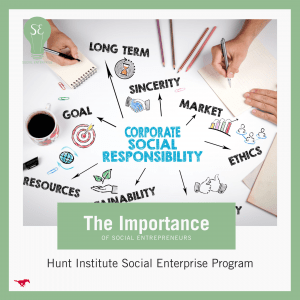If social enterprises are on the rise, should corporations address societal issues?
A year ago, the Business Roundtable, an association of CEOs from major American companies, issued a statement redefining the purpose of a corporation as serving all stakeholders and no longer just delivering value to shareholders. Harvard Business Review argued that one reason for this shift was because a profit-maximizing focus does not incentivize businesses to tackle the many challenges facing the world today like climate change, inequality, resource scarcity, and so forth. Even prior to this statement, a 2018 Deloitte study cited a trend towards enterprises increasing their focus on social impact.
Of course, today, the world is faced with an even more pressing challenge, the coronavirus pandemic. “This crisis has only sharpened the need for the work of social enterprises by laying bare the cracks in our systems, from healthcare to employment disparities, to upended education and gutted livelihoods,” says the SKOLL Foundation. Now, in the wake of the pandemic, is the time to solidify this idea that corporations don’t exist solely to serve their shareholders. The World Economic Forum shares that, “We can now explore an entrepreneurial way of life where enterprise can help communities across the globe solve socio-economic problems while being true to market forces. Maybe it is time for individual enterprise and collective purpose to work in harmony.”
Over the course of the last 5 months, we have seen many examples of established corporations as well as smaller-scale social enterprises taking this purpose to heart and doing their part to combat the pandemic. A couple of specific examples…
- T-Mobile was ranked by JUST Capital and Forbes as 5th out of the 100 largest U.S. corporations for their response. In addition to more paid time off and a relaxed attendance policy for their employees, the company was part of an effort to provide hospitals across the nation with 40,000 phone chargers.
- In Colombia, Fundación Capital, a nonprofit social enterprise, updated its virtual assistant to provide reliable information about the pandemic and tips for managing personal finances during a time of crisis.
As the UN Secretary-General Antonio Guterres stated, “Now more than ever, as big decisions are made about our future, companies need to address environmental, social and governance risks holistically and move beyond business-as-usual.”
To read more about the Hunt Institute’s work to develop future-focused solutions to some of the world’s biggest problems, please click here. For the latest news on the Hunt Institute, follow our social media accounts on LinkedIn,Facebook, Twitter, and Instagram. We invite you to listen to our Podcast called Sages & Seekers. If you are considering engaging with the institute, you can donate, or sign-up for our newsletter by emailing huntinstitute@smu.edu


